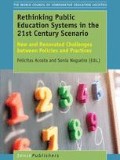Abstract
The primary goal of this chapter is to analyze the policies implemented by the Brazilian Federal government and the European Union (EU) in the area of higher education based on the analysis of documents produced by multilateral agencies. A second goal of this chapter is to investigate possible relationships between restructuring of Brazilian university model started during the government of president Fernando Henrique Cardoso and the educational policies currently implemented by the EU, which had the 1999 Bologna Declaration as a starting point.
Access this chapter
Tax calculation will be finalised at checkout
Purchases are for personal use only
Preview
Unable to display preview. Download preview PDF.
References
Antunes, F. (2005). Global governance and international guidelines for education in the European Union. Perspectiva, 23(2), 449–465.
Antunes, F. (2007). The European higher education space for a new education order? ETD – Educação Temática Digital, 9(esp), 1–28.
Barroso, J. (2005). Status, education and regulation of public policies. Educação & Sociedade, 26(92), 725–751.
Bologna Declaration. (1999). Joint Declaration of the European Ministers of Education Convened in Bologna on the 19th of June 1999. Retrieved from http://www.europa.eu.int/comm/education/ bologna_en.html
Cabrito, B. (2003). The Bologna process: Development of populations or responding to economic imperatives? XII Jornadas de la Asociación de Economia de la Educación (2013, January 29). Retrieved from http://www.pagina-aede.org/Oviedo/F6.pdf
Canário, R. A (2000). Escola e a Abordagem Comparada: Novas realidades e novos olhares. Sísifo: Revista de Ciências da Educação, 27–36.
Chesnais, F. (1996). The globalization of capital. São Paulo: Xamã.
Dale, R. (2008). Building Europe through a European education. Revista Lusófona de Educação, 11, 13–30.
Delors, J. et al. (1996). Education a treasure to discover. Report to UNESCO of the International Commission on Education for the XXI century, UNESCO, Paris.
Dias, M. A. R. (2003). Marketing in higher education: Is it possible to maintain the idea of public good? Educação & Sociedade, 24(84), 817–838.
European Commission. (2013, January 28). Communication from the commission to the European parliament, the council, the European economic and social committee and the committee of the regions. Brussels: European Commission. Retrieved from http://ec.europa.eu/education/higher-education/doc/com0911_en.pdf
European Commission. (2013, January 28). Learning programme lifelong. Retrieved from http://europa.eu/ legislation_summaries/education_training_youth/general_framework/c11082_pt.htm
Harvey, D. (1998). Postmodern condition (7th ed.). New York, NY: Basil Blackwell.
Harvey, D. (2004). The new imperialism. New York, NY: Basil Blackwell.
Harvey, D. (2005). Neoliberalism: History and implications. New York, NY: Basil Blackwell.
Leher, R. (1999). A new master of education? The educational policy of the World Bank to the periphery of capitalism. October, 1, 19–30.
Leher, R. (2007). ‘Fast delivery’ diploma: A feature of counter-reform of higher education. Retrieved from http://www.adur-rj.org.br/5com/pop-up/fast_delivery_contra-reforma_ed_sup.htm
Lima, K. (2007). Counter-reformation in higher education: FHC to Lula. São Paulo, São Paulo: Xamã.
Lima, L. C., Azevedo, M. L. N., & Catani, A. M. (2008). Bologna process, higher education and a few considerations about the New University. Avaliação, 13(1), 7–36.
Melo, A. (2004). The globalization of education: Consolidation of the neoliberal project in Latin America, Brazil and Venezuela. Maceio: UFAL-PPGE / CEDU.
Moreira, A. (2006). Internationalization of higher education. Foreign Affairs, 9(1), 29–37.
OECD. (2001). Schooling for tomorrow: OECD scenarios. Paris: OECD.
OECD. (2008). Higher education in the knowledge society. Paris: OECD. Retrieved from www.oecd.org/ edu/tertiary/review
Rosa, R. N. (2003). The reform dictated by the European Union. Retrieved from http://resistir.info/rui/ educacao_ameacada_5.html
Rummert, S. M., & Canàrio, R. (2009). Education youth and adult workers in Brazil and Portugal: Preliminary writings. In D. Souza & S. Martinez (Eds.), Comparative education: Routes Mar. São Paulo: Xamã.
Souza Santos, B. (Ed.). (2005). Globalization and social sciences (3rd ed.). São Paulo: Cortez.
Souza, D. B. (1996). The invisible hand of the market in the globalized pockets of social inequalities. Boletim Técnico do Senac, 22(2), 3–12. Retrieved from http://www.senac.br/informativo/bts/222/ boltec222a.htm
Teodoro, A. (2002). The new forms of transnational regulation in the field of educational policies or low intensity globalization. ECCOS Scientific Journal, 4(1), 61–77. Retrieved from http://redalyc.uaemex.mx/pdf/715/71540104.pdf
Torres, R. M. (1996). Improving the quality of basic education? The strategies of the World Bank. In L. De Tommasi, et al. (Eds.), The world bank and education policy. São Paulo: Cortez.
United Nations Educational, Scientific and Cultural Organization (UNESCO). (1999). Trends in higher education for the XXI century. Brasilia: UNESCO/CRUB.
United Nations Educational, Scientific and Cultural Organization (UNESCO). (2002). Constitution of the United Nations Educational, Scientific and Cultural Organization. Brasilia: UNESCO. Retrieved from http://unesdoc.unesco.org/images/0014/001472/147273POR.pdf
United Nations Educational, Scientific and Cultural Organization (UNESCO). (2003). Survey on trends and developments in higher education since the World Conference on Higher Education (1998–2003). In World conference on higher education. Higher education: Reform, change and internationalization (pp. 93–150). Brasilia: UNESCO Brazil / MEC / Sesu.
Wielewicki, H. G., & Oliveira, M. R. (2010). Internationalization of higher education: Bologna process. Ensaio, 18(67), 215–234.
Wood, A. I. (2009). Higher education in Europe and its relationship with Latin America: Cooperation between Portugal and Brazil. Revista Brasileira de Política e Administração da Educação, 25(1), 33–60.
Author information
Authors and Affiliations
Editor information
Editors and Affiliations
Rights and permissions
Copyright information
© 2017 Sense Publishers
About this chapter
Cite this chapter
Silva, R.M.D. (2017). The Restructuring of Higher Education in Brazil and the European Union. In: Acosta, F., Nogueira, S. (eds) Rethinking Public Education Systems in the 21st Century Scenario. The World Council of Comparative Education Societies. SensePublishers, Rotterdam. https://doi.org/10.1007/978-94-6351-020-2_2
Download citation
DOI: https://doi.org/10.1007/978-94-6351-020-2_2
Publisher Name: SensePublishers, Rotterdam
Online ISBN: 978-94-6351-020-2
eBook Packages: EducationEducation (R0)

